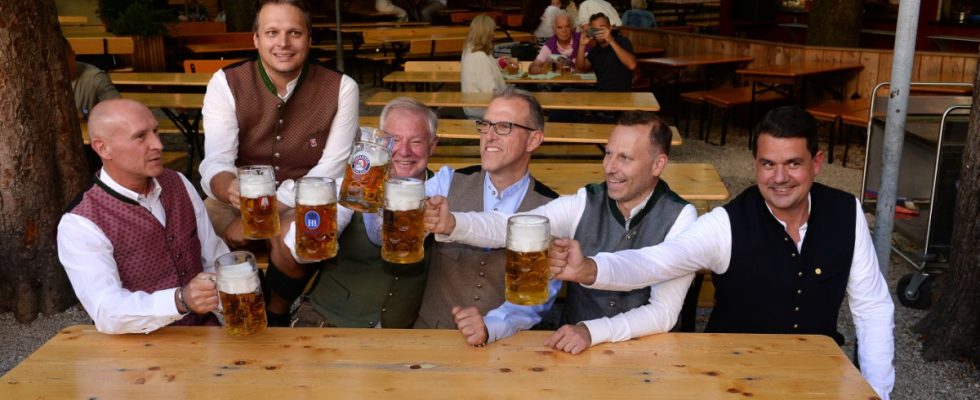In the third round of the public beer tasting, Karl-Heinz Knoll from the Munich Festring finally burst his collar. The festival ring sees itself not only as the organizer of the entrance of the Oktoberfest hosts and the traditional costume and shooting procession, but also as the keeper and mediator of tradition. And that’s why Knoll has to get rid of the fact that the noise level in the Max Emanuel Brewery’s tavern stinks: “It would be nice if everyone just shouted!” he shouts. “The point of the event is that I get to know the six Oktoberfest beers, and then you can really learn something!”
Afterwards it suddenly becomes much quieter in the hall. And at the front of the stage, the beer sommelier Marlene Speck and the two master brewers Rainer Kansy (Hacker-Pschorr) and Friedrich Geiger (Spaten) can continue their conversation. About the finely bitter hop bitterness that you can taste from the Hacker-Pschorr mass, whereas that of Spaten impresses with a “mild bitterness with an embedded hop note”.
But beyond all the sommelier poetry, which is also applicable to beer and often only means something to the expert drinker, there is actually a lot of new things to learn. Rainer Kansy, for example, says that you no longer need seven to eight liters of spring water to brew a Wiesnmass, but only three to four. So something is happening in terms of sustainability, and that is encouraging. “At least we don’t need water to wash cars or water lawns,” says Kansy.
On the other hand, the annual Oktoberfest beer tasting a few days before the first tap is of course not a dry specialist seminar on beer brewing. But a little celebration of anticipation in itself. That’s why the six beers from Hacker-Pschorr, Paulaner (master brewer Christian Dahnke), Augustiner (Andreas Brunner), Hofbräu (Rolf Dummert), Spaten and Löwenbräu (Bernd Kräußel) are also discussed in detail by all those invited – Oktoberfest hosts, guests from politics and gastronomy tested.
Andreas Steinfatt, Paulaner board member and chairman of the Munich Breweries Association, introduced the evening with memories of last year’s Oktoberfest. “This year we are at least as excited as last year,” he said, “We don’t need drizzle rain and an average temperature of 14.5 degrees again. Sometimes it was dreary.” This year, an “omega high” is on the way, which supposedly promises nice weather for the next few weeks.
In general, the conditions are excellent, even if the time for setting up the large tents is once again very limited “and when the tap is being tapped on Saturday lunchtime, the last ones are marching out at the back with the cordless screwdriver in their hand.” Steinfatt suggested that construction should start earlier in the next few years if the city council agreed to it.
Wiesnharmonie: The Green mayor Katrin Haben Schaden and CSU economics officer Clemens Baumgärtner with the Münchner Kindl.
(Photo: Robert Haas)
It was a good thing that CSU parliamentary group spokesman Manuel Pretzl was not the only one present and celebrating his birthday at the Oktoberfest beer tasting. But also the Green mayor Katrin Haben Schaden, the Wiesn city councilor Anja Berger (also Green) and the Wiesn boss Clemens Baumgärtner (CSU). There were even shared, unusually harmonious photos with Schaden and Baumgärtner, both separated for safety reasons by the Munich child, Franziska Inselkammer. Of course, neither of them commented on extending the construction time.
And the six Oktoberfest beers? According to Steinfatt, they are now recognized by the EU as a “Protected Geographical Indication”, something like Parmesan or Aceto Balsamico di Modena. He himself could vouch for the most important drink of the festival at any time: “Our master brewers have once again put their heart and soul into the Oktoberfest beer.” And of course not only that, but also water, barley, malt and hops. Or, as beer sommelier and former Bavarian beer queen Marlene Speck puts it: “Hops are our little, green all-rounder!”
In any case, the conclusion can be drawn: The six different Oktoberfest beers will probably all be drunk like nothing. And anyone who gets a fresh brew will rarely reject it with disgust and indignation simply because it doesn’t come from their favorite brewery.

